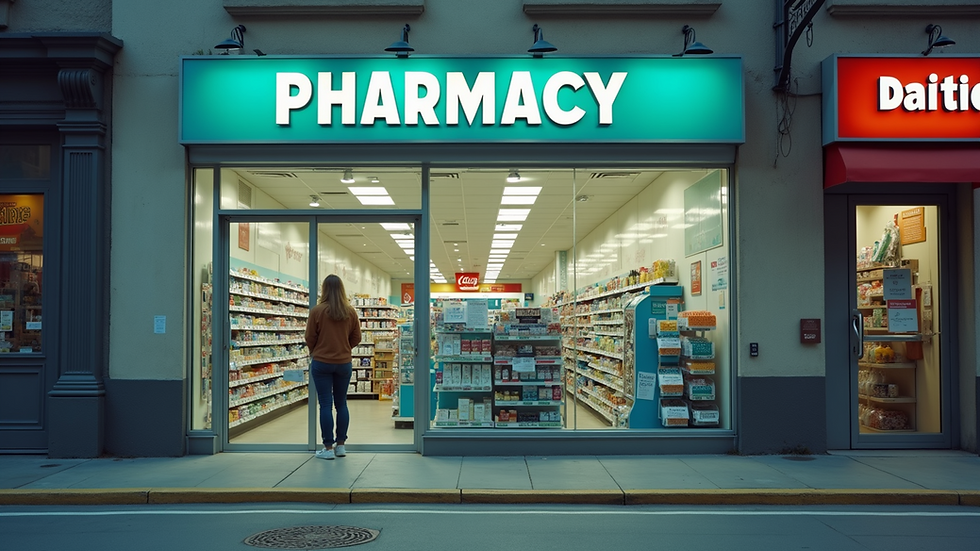The Importance of Accessible Pharmacy Services in Your Community
- Sep 8, 2025
- 4 min read
Access to healthcare is a fundamental need for every community. Among the many healthcare services, pharmacies play a crucial role in ensuring that people receive timely medications, advice, and support. Accessible pharmacy services are essential for maintaining public health, especially in areas where medical facilities may be limited or difficult to reach. This article explores why accessible pharmacy services matter, how they benefit communities, and what you can expect from your local pharmacy.
Why Accessible Pharmacy Services Matter
Pharmacies are often the first point of contact for individuals seeking healthcare advice or medication. When pharmacy services are accessible, it means that people can easily obtain the medicines they need without unnecessary delays or barriers. Accessibility includes factors such as location, opening hours, affordability, and the availability of knowledgeable staff.
For example, in rural or underserved urban areas, having a nearby pharmacy can prevent health complications by providing immediate access to essential medications. It also reduces the burden on hospitals and clinics by managing minor health issues locally. Accessibility also means accommodating people with disabilities, ensuring that pharmacy premises are easy to enter and navigate.
Moreover, accessible pharmacies contribute to better medication adherence. When patients can conveniently refill prescriptions and ask questions about their treatment, they are more likely to follow their healthcare provider’s instructions correctly. This leads to improved health outcomes and reduces the risk of hospital readmissions.

How Accessible Pharmacy Services Improve Community Health
Accessible pharmacy services enhance community health in several ways:
Timely Medication Access: Quick access to medications helps manage chronic conditions like diabetes, hypertension, and asthma effectively.
Health Education: Pharmacists provide valuable information about medication use, side effects, and lifestyle changes.
Vaccination Services: Many pharmacies offer flu shots and other vaccinations, increasing immunization rates.
Emergency Support: Pharmacies can provide over-the-counter remedies and advice for minor ailments, reducing unnecessary emergency room visits.
Personalized Care: Pharmacists often build relationships with patients, offering tailored advice and support.
For instance, during flu season, accessible pharmacies can serve as vaccination hubs, making it easier for people to protect themselves and others. This accessibility helps prevent outbreaks and reduces the strain on healthcare systems.

What can my local pharmacy do?
Your local pharmacy is more than just a place to pick up prescriptions. It offers a wide range of services designed to support your health and wellbeing:
Medication Dispensing and Management
Pharmacists ensure you receive the correct medication and dosage. They can also help manage complex medication schedules, reducing the risk of errors.
Health Screenings
Many pharmacies provide blood pressure checks, cholesterol testing, and diabetes screenings, helping detect health issues early.
Consultations and Advice
Pharmacists are trained to answer questions about medications, potential interactions, and side effects. They can also advise on minor health concerns.
Vaccinations
Flu shots, travel vaccines, and other immunizations are often available without an appointment.
Support for Chronic Conditions
Pharmacists can assist with medication reviews and offer advice on managing long-term illnesses.
Refill Reminders and Delivery Services
Some pharmacies offer reminders for prescription refills and home delivery options, making it easier to stay on track with treatment.
By utilizing these services, you can take a proactive role in your health and avoid unnecessary complications.

How to Make the Most of Your Local Pharmacy
To benefit fully from accessible pharmacy services, consider the following tips:
Build a Relationship: Get to know your pharmacist. They can provide personalized advice and support.
Ask Questions: Don’t hesitate to ask about your medications, side effects, or alternative treatments.
Use Technology: Many pharmacies offer apps or online portals for prescription refills and health information.
Plan Ahead: Refill prescriptions before they run out to avoid gaps in medication.
Take Advantage of Screenings: Regular health checks at the pharmacy can catch problems early.
Check Accessibility Features: If you have mobility challenges, ask about ramps, automatic doors, or delivery services.
By engaging actively with your pharmacy, you can improve your health outcomes and enjoy the convenience of local healthcare support.
The Role of Local Pharmacy Services in Building Stronger Communities
Accessible pharmacy services are a cornerstone of community health infrastructure. They provide essential support that goes beyond dispensing medications. Pharmacies often serve as health education centers, vaccination points, and trusted advisors. This accessibility fosters a healthier, more informed population.
Communities with well-supported pharmacies experience fewer hospital admissions and better management of chronic diseases. Pharmacies also contribute to economic stability by creating jobs and supporting local health initiatives.
If you want to learn more about how your community pharmacy supports health and wellbeing, explore local pharmacy services to see the full range of offerings available near you.
By prioritizing accessible pharmacy services, communities can ensure that everyone has the opportunity to maintain good health and receive timely care.
Accessible pharmacy services are vital for a healthy community. They provide convenience, expert advice, and essential health support that can make a real difference in people’s lives. Whether you need medication, health screenings, or vaccination, your local pharmacy is a valuable resource ready to help.



